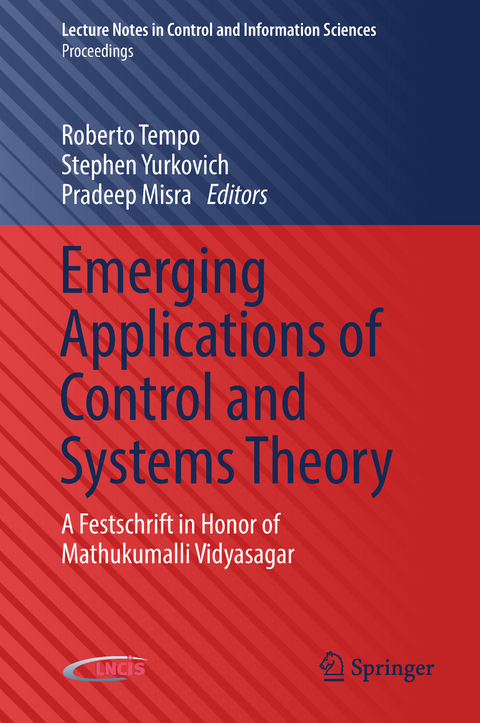
Emerging Applications of Control and Systems Theory
Springer International Publishing (Verlag)
978-3-319-67067-6 (ISBN)
Mathukumalli Vidyasagar was born in Guntur, India on September 29, 1947. He received the B.S., M.S. and Ph.D. degrees in electrical engineering from the University of Wisconsin in Madison, in 1965, 1967 and 1969 respectively. Between 1969 and 1989, he was a Professor of Electrical Engineering at Marquette University, Milwaukee (1969-70), Concordia University, Montreal (1970-80), and the University of Waterloo, Waterloo, Canada (1980-89). In 1989 he returned to India as the Director of the newly created Centre for Artificial Intelligence and Robotics (CAIR) in Bangalore, under the Ministry of Defence, Government of India. Between 1989 and 2000, he built up CAIR into a leading research laboratory with about 40 scientists and a total of about 85 persons, working in areas such as flight control, robotics, neural networks, and image processing. In 2000 he moved to the Indian private sector as an Executive Vice President of India's largest software company, Tata Consultancy Services. In the city of Hyderabad, he created the Advanced Technology Center, an industrial R&D laboratory of around 80 engineers, working in areas such as computational biology, quantitative finance, e-security, identity management, and open source software to support Indian languages. In 2009 he retired from TCS and joined the Erik Jonsson School of Engineering & Computer Science at the University of Texas at Dallas, as Cecil & Ida Green Chair in Systems Biology Science. In 2010 he was named the Founding Head of the newly created Bioengineering Department, a position that he held until 2013, at which time he moved to the Systems Engineering Department. Starting in 2015, he has begun to divide his time between UT Dallas and the Indian Institute of Technology Hyderabad, under the auspices of a Fellowship awarded by the Government of India. His current research interests are in the application of stochastic processes and stochastic modeling to problems in computational cancer biology and to compressed sensing.
Collective Control of Multiple Constant-Speed UAVs with Wind Effect.- Optimization for Metabolic Rate Estimation in Hyperpolarized Carbon-13 MRI.- Control and Systems Theory for Advanced Manufacturing.- Network Systems in Science and Technology.- Robustness Scaling in Large Networks.- Feedback Control for Distributed MIMO Communications.- Control Systems Theory Applications in Synthetic Biology.- Manipulating Time: A Model Predictive Control Approach to Circadian Entrainment.- Robust Transportation on Graphs.- Identification of Dynamical Networks.- Hierarchical Decentralized Control for Networked Dynamical Systems with Global/Local Objectives.- Dynamic Modelling of Bacterial Plasmids: Transfer and Curing within Populations.- Novel Systems and Control Directions in Integration of Renewable Electric Energy into Power Grids.- The Prices of Packets and Watts.- System Completion Problem: Theory and Applications.- Optimal Actuator/Sensor Location for Distributed Parameter Systems.- Feedback and Control in Biological Circuit Design.- Privacy in Networks of Interacting Agents.- Differential Analysis of Nonlinear Feedback Circuits.- Characterization of Distributed Controllers for Multi-Agent Coordination.- Curvature and the Robustness of Biological Networks.- Networked Parallel Algorithms for Robust Convex Optimization with Nonlinear Uncertainties.- On the Consensus Problem for Multi-Agent Systems with Positivity Constraints.- Hypertracking beyond the Nyquist Frequency.
| Erscheinungsdatum | 22.03.2018 |
|---|---|
| Reihe/Serie | Lecture Notes in Control and Information Sciences - Proceedings |
| Zusatzinfo | XXV, 393 p. 65 illus., 25 illus. in color. |
| Verlagsort | Cham |
| Sprache | englisch |
| Maße | 155 x 235 mm |
| Gewicht | 823 g |
| Themenwelt | Technik ► Elektrotechnik / Energietechnik |
| Schlagworte | automatic control engineering • Communications Engineering, Networks • Communications engineering / telecommunications • Computational Biology • Control • Control in Synthetic Biology • cybernetics & systems theory • Cybernetics & systems theory • Electrical Engineering • Engineering • Engineering: general • Life sciences: general issues • Mathematical and Computational Biology • Maths for scientists • Multi-agent Systems • Networked control systems • Power Electronics, Electrical Machines and Network • Power Systems • systems biology • Systems Theory, Control |
| ISBN-10 | 3-319-67067-0 / 3319670670 |
| ISBN-13 | 978-3-319-67067-6 / 9783319670676 |
| Zustand | Neuware |
| Haben Sie eine Frage zum Produkt? |
aus dem Bereich


